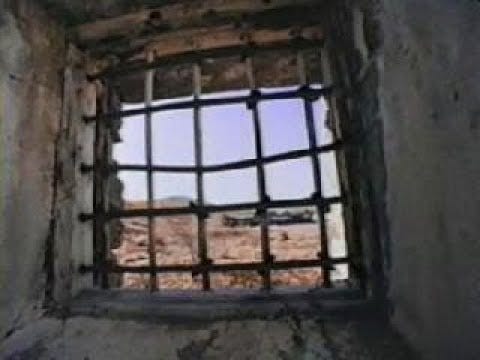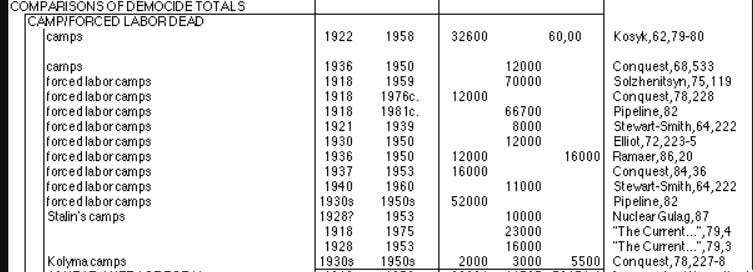The gulags under Stalin - how many died?
Why do Wikipedia and Britannica take Russia archival records as the only numbers that matter?
I listened to the abridged version of “The Gulag Archipelago” by Aleksandr Solzhenitsyn on Audible recently. I would recommend it to anyone; however it is pretty upsetting and depressing.
I listen to books while falling asleep, so I end up listening out of order and often miss parts without knowing it. However, I consider this as a price worth paying, because otherwise my thoughts race at night and it takes longer to go to sleep, I just wouldn’t be reading most of these books in print form, and I don’t have a long commute to make listening while driving or riding practical.
Anyway, Solzhenitsyn was a prisoner in one of the Soviet Union’s Gulags, or work camps, from 1945 to 1953. He was given an 8 year sentence for writing something critical about Joseph Stalin a letter to a friend. I haven’t been able to dig up anything more detailed than what wikipedia says about his time in prison, but apparently some of the time was spent in a relatively comfortable prison for professionals doing some type of research or professional work - he had a degree in math and maybe physics as well. Some of the time he was doing menial work.
His book is largely a recollection of stories of people he knew in the prisons, secondhand stories, and a history of the gulags.
He estimated that 50 million people died in the gulags. I am a little doubtful the figure was quite this high, as his number is on the high end of ANYONE’S estimates, and also some of his details don’t add up. (He estimated 1% died each month. That would mean less than 1/3 would survive a 10 year prison term. So, I don’t know…)
85% of these people hadn’t done anything wrong - they were either caught up in purges or simply arrested because the local committees had quotas to meet. Yup, ordinary people had a lot to fear because of quotas. If someone had a grudge against you, they could denounce you, and that was usually enough as well.
People were tortured for confessions. Solzhenitsyn was tortured for months before he “confessed”. I’m not sure why anyone would hold out - they had to realize there was basically no hope once one was arrested.
Current and prior popular encyclopedia estimates of gulag deaths
Current Encyclopedia Britannica online says about deaths in the gulags: “Western scholarly estimates of the total number of deaths in the Gulag in the period from 1918 to 1956 ranged from 1.2 to 1.7 million.” The only real hint the current Britannica gives about the horrors of the gulag is the estimate that about 5 million people were held prisoner at any time during Stalin’s reign, and that the prisoners included “many innocent people”.
I was able successfully install an old CD-ROM copy of Encyclopedia Britannica for Windows from 2001. It gave a different estimate: “Western scholarly estimates of the total number of deaths in the Gulag in the period from 1918 to 1956 range from 15 to 30 million.”
Here’s what wikipedia says the old estimates were: “Prior to the dissolution of the Soviet Union, estimates of Gulag victims ranged from 2.3 to 17.6 million”. What a lie!
Wikipedia then goes on to say that examination of soviet era records shows 1.054 million people died in the gulags, but since a lot of people were discharged on the point of death, the real death toll between 1930 and 1953 would be more like 1.6 to 2.5 million people. Basically wikipedia is now taking old soviet records at face value and doing light massaging of them, and letting us think that is the accepted truth.
Here’s one source with a list of estimates: https://www.hawaii.edu/powerkills/USSR.TAB1A.GIF
I admit I have not closely examined this webpage. If the author turns out to have unsavory views of some sort, I do not endorse them. I am just using the table he is providing.
The columns in the third section are low mid and high estimates. Numbers are in 1000s. On the line that says “16,ooo”, ie 16 million, that 16,000,000 number is straight from Nikita Kruschev. Granted, Nikita Kruschev was trying to convince the Soviet Union that Stalin was bad news, but still - the smallest of the numbers that extend into the 1950s (except for the Kolyma camps, which were a group of camps in the far north) is 12 million.
Other observations about the Britannica and Wikipedia articles
The Britannica article is short. Britiannica articles used to be quite long, even exhaustive. The wikipedia article includes a lot more but it doesn’t say anything about the torture methods used to get confessions, that local officials had quotas to meet and would sometimes resort to grabbing people off the street to meet their quota of people to send to the gulag, or that people could be arrested because someone denounced them.
The effect of the gulag system on ordinary Soviet citizens
Neither article gives one the sense of the fear that ordinary Soviet citizens had to live under during the whole of the Stalin regime, and to a lesser extent, until the breakup of the Soviet Union. A person could come home at the end of the day and find that their husband or wife had been arrested. They would not be able to see them again for years. They probably wouldn’t know what their fate was for months. They probably would only be able to exchange letters once a year at most. And the pay that the husband or wife had brought in was gone. Neighbors and relatives were often afraid of being associated with someone who was suspected of being an enemy of the state, so they might not be able to turn to others for help.
Wikipedia is a very biased source these days, but I don’t understand why it and Britannica are soft-pedalling the horrors of the gulags. The Soviet Union doesn’t exist anymore. Communism is gone from Russia. While Russia isn’t exactly the bastion of freedom that the US once was, it’s not the Soviet Union either, and as far as I know, isn’t trying to defend the gulags or continue them.
I was sitting on a draft of this for three months. I finally got around to watching part of a documentary (it’s in Russian with subtitles), and decided to finish this and put it out. The documentary is a little disappointing, but it has some hair-raising stories of some of the atrocities that happened in the camps.
Let’s pray we don’t descend to this level of totalitarianism again.



